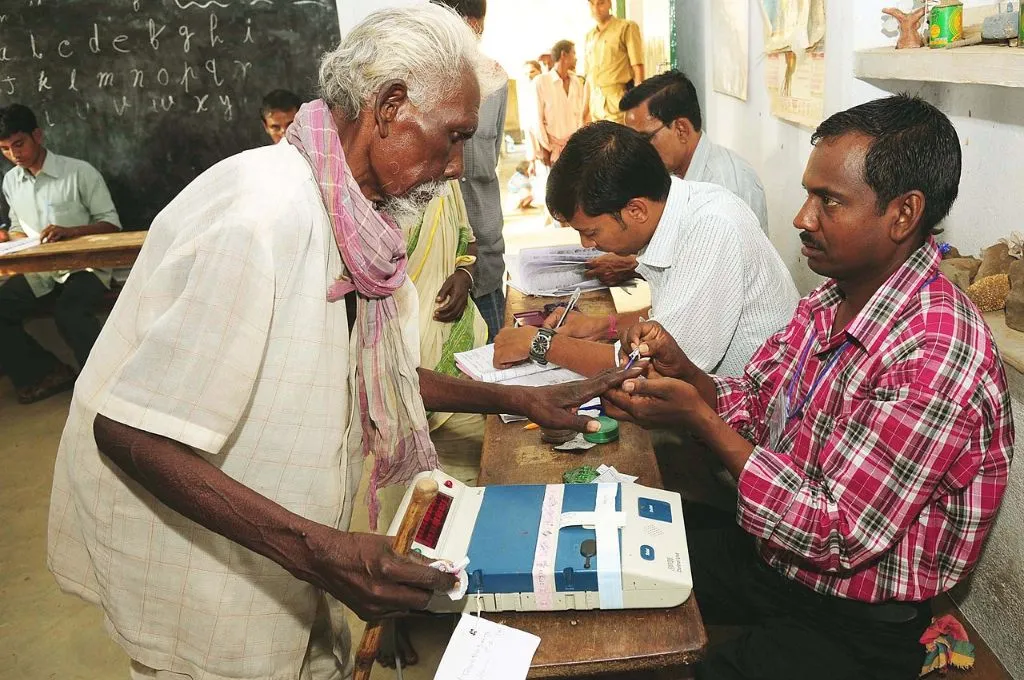The Supreme Court of India’s verdict in the case of INSAF (Indian Social Action Forum) challenging the FCRA (Foreign Contribution Regulation Act, 2011) on March 6, 2020, was one of the most decisive affirmations of civil society’s role as a political actor in India. The judgement reaffirmed the legitimate and critical role civil society has to play to ensure that democracy in India thrives, including through political action.
The court has clearly pronounced that political work as defined for democracy and rights is legitimate.
With far reaching consequences, the judgement upholds the right of civil society to undertake political work and action. At the heart of this is the distinction between political action for political power on the one hand; and political action for furthering rights, development, human dignity, constitutional values, and democracy, on the other. The court has clearly pronounced that political work as defined for democracy and rights is legitimate.
It is noteworthy that this judgement is in relation to FCRA and foreign funds for civil society, an issue that is considered extremely sensitive, particularly in a post-colonial context. It can, therefore, be safely deduced that domestically funded civil society would have greater latitude for political action.
Surprisingly, the judgement has been timidly received by civil society
Barring a few notes of welcome, much of civil society remained rather muted, which begs a few questions: Was the hard-fought case by INSAF in vain? Were the importance and ramifications of the judgement not clear? Or, are we indifferent to the fundamental question of our role in politics?
A few days prior to the judgement, towards the end of February 2020, the country’s capital was engulfed by one of the worst communal riots post-Independence. It saw people getting brutalised, maimed, and killed in communal frenzy. Majoritarian politics had pushed the city into an abyss from which retrieving compassion, humanity, and human dignity seemed impossible.
Delhi is considered to be the epicentre of civil society organisations, networks, campaigns, and movements. It certainly claims to represent the diversity and strength of civil society across the country. However, barring a few individuals and organisations, such proximity to the ground of this communal violence did not lead civil society organisations to respond to the situation on the ground, nor take a strong position in favour of secular politics and compassionate coexistence. Why did organisations shy away from coming out openly and putting their weight and resources behind rights, justice, and dignity for all?
It is imperative for civil society to engage with the question of our own depoliticisation.
A quick look at the vision and mission of most of the civil society groups indicates their foundational commitment to development, rights, justice, dignity, secularism, and compassion. In other words, a vision and mission rooted in a deeply political world view. In spite of these clearly stated commitments, if organisations did not act, we need to explore the reasons behind this.
The oft-repeated reason heard was that these are ‘political’ issues.
In the current historic juncture, where socio-economic and political forces are challenging our notions of democracy, world views, and values so well-articulated in the preamble of the Indian Constitution, it is imperative for civil society to engage with the question of our own depoliticisation, if we have to remain relevant in the future of a dramatically changing world.
Charity or activism: A zero sum game?
There will always be a large segment of civil society doing charitable work. They are much needed in a country like India which continues to see endemic and extreme poverty, diseases, and large populations without basic human needs. However, another large part of civil society is, by definition, engaged in political processes for building just, peaceful, humane, and sustainable futures. In great measure, their primary engagement is with the question of uneven and unjust distribution of power, and its consequences on individuals and societies. These might be seen as different paths, but the central theme of democratising ‘power’ remains fundamental to the varied, diverse concepts of civil society.
Despite such strong ideological rationale for civil society’s political work, we have moved to a space where our aspirations and rhetoric are political, but praxis and practice are apolitical.

The result of this fundamental contradiction is mission drift, loss of commitment by the staff, and the diminishing credibility of the sector. | Picture courtesy: Unsplash
Why is civil society less political today?
Over the past couple of decades, there has been a growth of funded organisations that started replacing people’s movements or community-based collectives that work with voluntary resources (both money and people) and passion for change.
Some of these organisations ended up with large assets—including land, training centres, large numbers of paid staff, and big projects. This inspired smaller organisations to graduate from being individual or voluntary initiatives to structured entities.
As these entities developed interests in sustaining their organisations, their ability to question the powerful became compromised.
As these entities developed interests in sustaining their organisations, their ability to question the powerful became compromised. Their ability to politically challenge state power and its vested interests diminished, compounded by a restrictive and harsh regulatory framework for civil society. When contesting power—which is inevitable in the pursuit of justice and dignity for the marginalised and excluded—these civil society groups had to take up apolitical positions to ensure that their organisational stability was not jeopardised. If organisations were funded by foreign sources, they were even more vulnerable (as foreign interest is seen with suspicion in the political arena).
It soon became the learnt behaviour for organisations to ask political questions, but refrain from pursuing them if those in power might be challenged, and retaliate. These organisations (and a very large section of civil society) stopped acknowledging the fact that change, particularly change in favour of the underprivileged and excluded groups, usually comes at a cost. As a result, their role gradually shrunk to identifying, analysing, and articulating the issues and demands of the poor and marginalised. This meant civil society groups started doing research, trainings, implementation of schemes and programmes, policy inputs, advocacy, and so on, but moved away from the fundamental role of organising and mobilising people’s power to challenge established power relationships.
The voluntary sector, as civil society was called earlier, was seen as inefficient by many, who started pushing forth a narrative of professionalising the sector. This meant more structured ways of working, bureaucratic processes, and new developmental tools to address societal problems.
Without getting into the inadequacies of techno-managerial tools of development, it is important to underscore that these changes started transforming the voluntary nature of civil society, which functioned with passion for socio-economic change, into professional institutionalised organisations. Over the last decade, they have moved even further away from their voluntary nature and are increasingly using organising principles of the corporate world. Deeply political problems such as inequity, indignity, and injustice are being seen as professionally solvable problems, which put the political lens on the back burner.
The push for efficiency and impact from a business management lens, with an added emphasis on scale in the last decade, has led to further depoliticisation of civil society. It assumes that social change can happen through a designed intervention, and we moved from working on organisational vision and mission to donor sanctioned projects. Donor priorities ended up influencing interventions and ‘projectised’ the sector’s work. It became simpler for projects to skirt around core issues of power distribution and end up with marginal gains.
Funding agencies talk about a systems approach but continue to fund short-term, time-bound, logframe-led projects.
However, organisations soon realised that a project approach was inadequate and ineffective, and we shifted from a silos approach to a systems approach. The systems approach recognises that change in one aspect of society cannot be achieved in isolation of the larger social, economic, and political system in which it operates. It also recognises that diverse components of the system are interdependent, interconnected, and work in intermeshed ways.
But this shift has been largely rhetorical: organisations ended up using a systems lens in their vision, mission and long-term strategic plans, but their operational work plans, budget allocations, organisational structure, and competencies continue to work with a silos approach. Funding agencies and donors also talk about a systems approach but continue to fund short-term, time-bound, logframe-led projects. The result of this fundamental contradiction is mission drift, loss of commitment by the staff, and the diminishing credibility of the sector.
The institutionalisation of civil society has also meant an increasing desire for order and the need to locate its work in an ‘orderly’ environment. This is in direct contrast to the processes of change, which are unruly and messy. In the search for order, civil society ended up engaging more and more with the state, as it has a ‘structured framework of engagement’.
However, this search meant that civil society groups moved away from a direct connect and substantive engagement with communities. This lack of engagement with communities has had two very critical consequences.
First, the legitimacy of the civil society in front of the state and market has declined, as the unique strength of civil society is its proximity to communities. Many of us, and our donors, do not understand this, and continue to work with techno-managerial approaches instead of people-centric approaches that are rooted in communities.
Second, this vacation of space has led to alternative civil society groups embedded in religious, fundamentalist and conservative world views gaining significant ground. This shift on the ground has far reaching consequences for the polity of the country, and has been one of the important factors in the rightward shift of Indian politics.
Civil society is getting marginalised
These major shifts in the way civil society operates has resulting in strands of work around advocacy, lobbying, research, policy and campaigning being given more space than activities around collectivisation, critical pedagogy, and organising and mobilising people and communities to challenge the status quo.
By definition, civil society has to work within a framework of non-violence, but it does not mean that we cannot offer radical responses to injustice and indignity. Our inability to deal with chaos and engage real power has made us a marginal actor in the central discussions of the public domain shaping our polity, society, and economy.
The process of this disengagement with politics is paving the road towards civil society’s marginalisation.
Civil society cannot sit on the sidelines and remain neutral.
The last few years have witnessed large scale people’s movements across the world—the Occupy movement, the Arab spring, and last year’s protests in Hong Kong, Beirut, Columbia and in our own country against corruption, anti-rape protests, and most recently, the anti NRC/CAA protests. These movements are redefining the future, but organised civil society has made little contribution to them. This apolitical role of civil society has resulted in civil society organisations losing their purpose. Giving the declining efficacy and sanitised approach to change, the credibility of civil society, and public trust in it is also getting eroded.
At this moment, when the foundational values that defined the 20th century are under stress and the social contract is undergoing unprecedented revisions, as ideas and ideals of citizenship, nations, democracy, justice, and freedom are being redefined; civil society cannot sit on the side lines and remain neutral. It needs to reengage with communities and politics to play a central role in defending, deepening, and promoting the progressive ideals of liberty, equality, fraternity, justice, and democracy.
Author’s notes:
- It is important to acknowledge that Indian civil society includes a very broad range of actors and has tremendous diversity. The spectrum of engagement of groups with political questions also varies significantly. This article focuses on the groups working in the development and rights space, while recognising that even within this space, there might be varied trajectories.
- The conceptualisation of ‘political’ in this article does not mean political parties or electoral politics. It focuses on power dynamics—which can manifest in several forms—ranging from the power of patriarchy to the caste system. It could look at questions of economic imbalances, exclusion of communities, or denial of rights to individuals. This is not about governments, political regimes, or political parties.
Views expressed are personal.
—
Know more
- Read this paper on civil society, political participation, and the power of movements.
- Explore this critical introduction on politics and development.
- Watch this panel discussion on how the India’s social sector can re-frame its power equation with government and the market.
Do more
- Organise debates and discussions and respond the key issues being raised in this article—in support, or to challenge it.
- Take an ‘inside-outside’ view of civil society’s work and evaluate the current landscape from a perspective that analyses our ability to democratise power and work towards systemic change.
- Do this exercise with peers from other sectors—trade unions, students movements, engaged journalists and academics, and even political parties.





